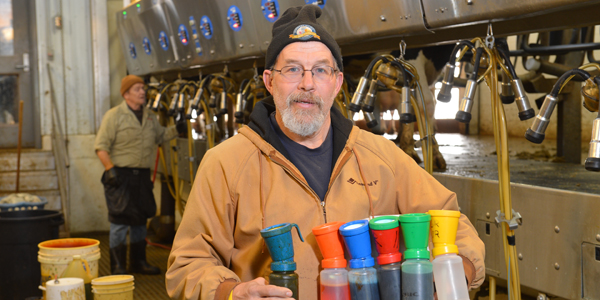
Making Sense Out Of Science
Animal Science Professor Leo Timms has a knack for making science simple. The extension dairy specialist leads the Iowa State Dairy team, which develops and provides educational events and publications addressing all areas of dairy production.
“I try to help make things simple and understandable, including economics, so ultimately people can make better decisions that improve animal health, animal wellbeing and product safety. When you do all those, it’s profitable for the farmer and everyone else,” says Timms.
Donna Moenning, senior vice president of integrated communications at the Midwest Dairy Association, says Timms “makes sense out of science” for the entire dairy industry, health professionals and the general public.
“It’s a win for everyone, including consumers, who value sound, fact-based, transparent information about how their food is produced,” says Moenning.
Mario Lopez-Benavides, manager of technical service and clinical trials at DeLaval Manufacturing, says Timms’ “whole-picture approach” and his “keep it simple” attitude is what makes him a great teacher, researcher and developer of new products and processes.
“For our research and development team working on milk quality and animal health, partnering with Leo in developing practical, on-farm solutions over many years of collaboration has been a success,” says Lopez-Benavides.
In his 27 years at ISU, Timms has given over 550 invited talks on everything from dairy economics and finance management to crop, manure and energy systems to human resource management. And his research has provided new tools and processes needed by the dairy industry to ensure animal health and performance.
His sealant technologies for mastitis prevention resulted in seven patents, commercialization and use worldwide. Marketing surveys in 2012, by Hoard’s Dairyman, showed a 58 percent adoption rate of these technologies in North America. And his collaborative research on simple mastitis tests at calving is used by more than 40 percent of the industry. His observational model on teat health led to development of international teat health scoring systems and adoption worldwide.
Timms’ current research includes ways to keep dairy cows’ feet and legs healthy and novel ways to treat diseases in dairy cows with antimicrobials.
Timms teaches numerous classes on campus—many of which he developed— about dairy farm practices and management and animal health and performance.
Patrick Gorden, director of Food Supply Veterinary Medicine at Iowa State and former student of Timms, says Timms’ first-in-the- nation dairy animal production medicine course in 1984, “led to the development of similar courses in all of the other food animal species. These courses have become a core essential in the education of food animal veterinarians throughout the country.”
Timms also has responsibilities for the Iowa State Dairy, which, at any given time, has a herd average of 440 cows and 330 growing calves. He and the rest of the dairy team are currently researching cost-effective dairy milking systems that make milking less physically demanding for dairy producers.



